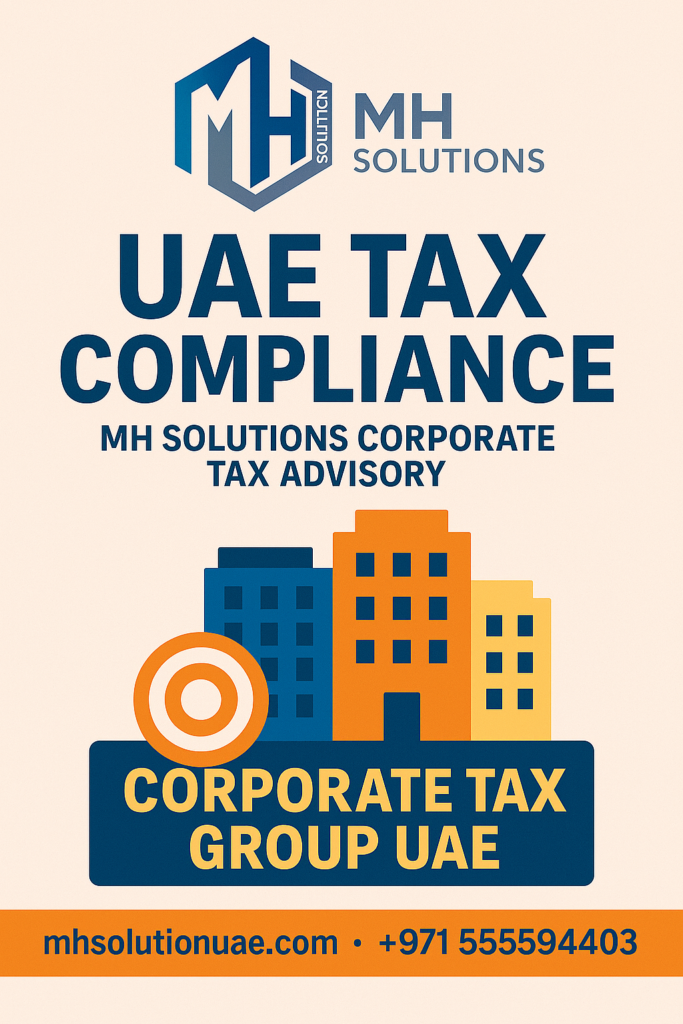As the UAE’s corporate tax system continues to evolve, companies are actively seeking ways to simplify compliance and reduce liabilities. One highly effective approach is forming a corporate tax group in the UAE. This method allows qualifying entities to file taxes as a single unit, offering administrative convenience and financial advantages. In this guide, we’ll explore the compliance essentials, eligibility rules, and how MH Solutions corporate tax advisory helps businesses take full advantage of tax grouping.
What is Corporate Tax Grouping in the UAE?
Corporate tax grouping allows a UAE parent company and its eligible subsidiaries to be treated as one taxable entity by the Federal Tax Authority (FTA). Instead of filing individual returns, the group submits a consolidated tax return, significantly streamlining the filing process and offering strategic tax planning opportunities.
Visit mhsolutionuae.com or call +971 555594403 for personalized tax assistance.
Key Eligibility Criteria for a Corporate Tax Group UAE
To form a corporate tax group, the following conditions must be satisfied:
- Juridical Resident Persons: All members must be UAE-resident legal entities.
- Ownership: The parent must hold at least 95% of the shares, voting rights, and profit entitlements of each subsidiary.
- Uniform Financial Reporting: All companies must use the same financial year and accounting standards.
- Non-Exempt Status: Neither the parent nor any subsidiary can be an exempt person or a Qualifying Free Zone Person (QFZP).
- FTA Approval: An official application must be submitted before the end of the relevant tax period.
UAE Tax Compliance Obligations for Tax Groups
Once approved, a corporate tax group must meet specific UAE tax compliance standards:
- Single Tax Return: A consolidated return is submitted by the parent company.
- Audited Financials: Groups must prepare special purpose audited financial statements.
- Entry/Exit Tracking: Members joining or leaving the group must meet all updated criteria.
- Tax Loss Handling: Pre-group tax losses can be forfeited or managed based on current regulations.

Why Tax Grouping Matters for UAE SMEs
Corporate tax grouping is especially beneficial for small to medium-sized enterprises operating multiple legal entities. Here’s why:
- Lower Compliance Costs: Fewer filings mean reduced administrative effort and cost.
- Loss Offsetting: Losses from one group company can be offset against profits from another.
- Simplified Intragroup Transactions: Transactions between group members are typically disregarded for tax purposes.
- Optimized Cash Flow: Centralized management leads to better financial planning and improved liquidity.
How MH Solutions Corporate Tax Advisory Supports You
MH Solutions UAE offers comprehensive tax advisory tailored to your business structure and goals:
- Eligibility Assessment: We review your corporate structure to confirm grouping feasibility.
- FTA Application Support: From documentation to approval, we handle the full application process.
- Compliance Monitoring: Ensure on-time filings, accurate reporting, and proper document retention.
- Strategic Tax Planning: We guide you through tax loss utilization, group restructuring, and more.
Contact MH Solutions UAE at mhsolutionuae.com or call +971 555594403 for expert guidance on forming your corporate tax group.
Frequently Asked Questions (FAQs)
Q1: Can any UAE company form a tax group?
No, only companies that meet the FTA’s legal and ownership criteria can form a tax group.
Q2: What if a member no longer qualifies?
The company will automatically exit the group from the start of the tax period in which it became ineligible.
Q3: Are tax grouping rules the same as VAT grouping?
No, corporate tax and VAT grouping have different requirements and benefits.
Q4: Do all tax groups need audited financials?
Yes, audited aggregated financial statements are mandatory for all corporate tax groups.
Q5: Why choose MH Solutions UAE?
We offer trusted, end-to-end support to ensure your group is compliant and strategically positioned.

